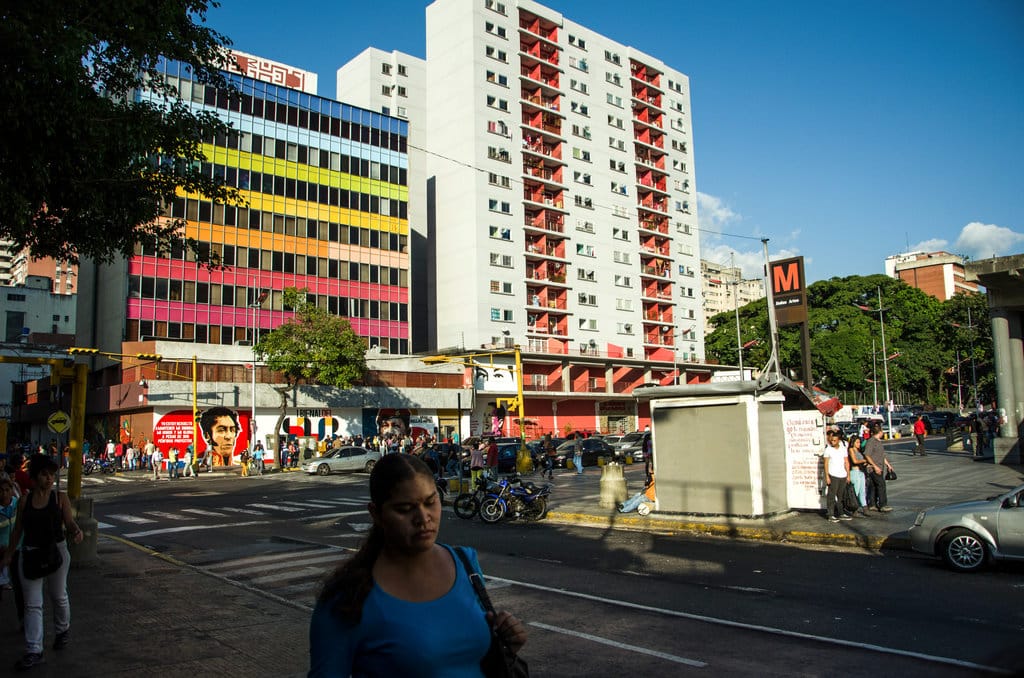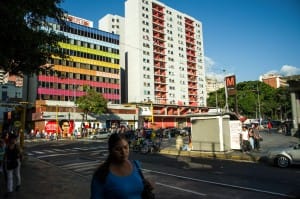
Foes May Hate Hugo Chávez, but They Like His Political Playbook

CIUDAD MIRANDA, Venezuela — Twenty thousand people live in this concrete bastion built by President Hugo Chávez. He gave them the keys, and they gave him their votes.
There was one thing Mr. Chávez promised but never handed over en masse, though: the property titles that would allow his supporters to sell their homes and cash out.
But now that Mr. Chávez’s old adversaries have taken over Venezuela’s Parliament, they are adopting the tactic and doing it one better. They want to give away the deeds to hundreds of thousands of homes that Mr. Chávez and his movement built — and win the loyalties of the nation’s poor for years to come.
The handover is as big as just about any of the Socialist-inspired giveaways Mr. Chávez ever orchestrated, and it comes with an incongruous twist. For years, the opposition cried foul over Mr. Chávez’s tendency to use the spoils of Venezuela’s oil wealth to hand out housing, calling it an obvious ploy to buy votes.
Now the new leaders are drawing from the same populist playbook that they made their name criticizing, a telling sign that the strategy of winning trust through government largess has not gone away.
“The opposition is trying to imitate the popular aspects of Chavismo,” said Francisco Rodríguez, an economist at Bank of America Merrill Lynch, referring to Mr. Chávez’s political movement.
Having taken power in the National Assembly this month for the first time in 16 years, Mr. Chávez’s opponents quickly carted away the portraits of him from the Capitol, drafted a proposal to free politicians jailed by the government and even threatened to recall President Nicolás Maduro, Mr. Chávez’s loyal successor.
But the country’s disastrous economy is adding to the pressure on the lawmakers to do something popular. The International Monetary Fund is expecting inflation of 720 percent a year in Venezuela, and rampant food shortages create hourslong lines at stores. The price of oil, the country’s lifeblood, has collapsed. With Mr. Maduro in the presidency, the legislature has no control over economic policy.
And so the lawmakers have turned to the hundreds of thousands of homes that Mr. Chávez and his followers built.
The question of who controls the titles to the homes goes well beyond a one-time giveaway. Mr. Chávez, who died of cancer in 2013, turned petroleum dollars into concrete, setting off an experiment of moving Venezuela’s poor from slums into high-rises. Mr. Maduro has followed in his predecessor’s footsteps, but even governments before Mr. Chávez’s courted voters with homes.
“It gets at the heart of what the economic model should be in Venezuela,” said David Smilde, a sociologist at Tulane University who lives in Caracas, the capital. “Should it be about poor people deciding what to do with their own property, or should it be about the government ultimately making the decisions?”
Julio Borges, the legislator who is drafting the law, argues that the homes will give capital to the poor for the first time, drive activity to help ease Venezuela’s economic crisis, and let the poor determine their own fates from now on.
“People had been treated like they were children,” he said. “With this law you can make a sale and give an inheritance, something you can’t do now.”
Maduro supporters see any proposal to transfer the titles as snake oil, a blatant attempt to claim credit for a vast store of homes built as public property.
“We gave people dignified housing,” said Darío Vivas, a legislator in Mr. Maduro’s United Socialist Party. “Julio Borges and the opposition haven’t built one home.”
Mr. Vivas argued that the government had already delivered on its promise to hand over property titles, a position widely held by leftists. But many experts countered that if the government ever gave deeds to the homes, it was most likely only in a few cases and that most residents do not have titles.
In a fiery State of the Union address before legislators this month, Mr. Maduro vowed to do what he could to block his opponents’ work.
“You will have to topple me first to approve a privatization law,” he said to the applause of leftists.
Here in Ciudad Miranda, about an hour’s drive from Caracas, Coromoto Carmona, 40 and unemployed, looked out a window that was laden with bars. She told the story of how she got her home here and how it has become a place where she feels trapped.
Ms. Carmona lost her first home in a deadly mudslide in 1999 and spent five years bouncing between government-run shelters. In 2004, she received a thrilling call from the government: She would attend a meeting at Mr. Chávez’s presidential mansion, La Casona, where he would personally award her a new home.
She moved into her two-bedroom home with nine members of her family. But problems soon emerged. Ms. Carmona realized there were no places to buy groceries, few schools and no public spaces for residents. These days, there is water for only four hours once a week.
Mr. Chávez’s government had promised her and others the titles to their homes. But Ms. Carmona received only a laminated piece of paper saying she was allowed to live there. If she leaves, it is unclear if she will be able to find anywhere else to live.
“It’s like jail here,” she said.
Franco Micucci, an architect who worked on Ciudad Miranda, says its social problems are not unique and will be as much a challenge to Venezuela’s new leaders as they were to Mr. Chávez’s movement. He says that he and colleagues originally drew up plans for public spaces and services like schools and grocery stores for residents at Ciudad Miranda. But the government built only the homes.
“I’m not surprised residents want to leave that place,” he said. “Me and many architects were optimistic,” but in the end “Ciudad Miranda is like ‘Ciudad de Dios,’” he added, using the Spanish name for “City of God,” a Brazilian film about the drug-ridden slums of Rio de Janeiro.
Residents of Ciudad Miranda say the area is now run by armed gangs, known locally as colectivos, that are aligned with Mr. Maduro’s party. Despite losing its majority in the legislature, the president’s party won in Ciudad Miranda.
Yoni Iriarte, a 26-year-old opposition activist, said he was threatened during a get-out-the-vote campaign by members of colectivos who surrounded him on motorcycles.
“They told me, ‘The government will take away your house,’” he said. Other residents in the neighborhood, including Ms. Carmona, reported receiving similar threats.
Mr. Iriarte said that being granted the title to his house would allow him to vote freely.
“If there is no blackmail of the government revoking my home, then I can vote for whomever I want, no matter who happens to be president at the time,” he said.
Ricardo Hausmann, a Harvard economist who worked for the government in the 1990s, sees other benefits, too.
By creating homeownership for Venezuela’s poor, lawmakers would create capital for those who did not have it, something that could lead to long-term social mobility.
“Having property rights means you have an asset, you are empowered,” he said, referring to past projects that did the same with Argentine public housing. “The effects are huge: You save, you invest, you improve your home.”
Mr. Rodríguez, of Bank of America, was more cautious. He cited land redistribution plans after the Mexican Revolution in which peasants were given the titles to small plots and eventually the ability to sell them. In the end, many of the plots were bought up by big owners, something he says might happen with the Venezuelan apartments.
“If you allow people to sell without restrictions, you can create new problems,” he said.
Marquesa Alcendra, 68, wants to sell. After losing her house to a mudslide and bouncing for years between temporary shelters — and even, for a time, an unfinished skyscraper called the Tower of David that was occupied by squatters — she was given a home in Ciudad Tiuna, a housing project that Mr. Chávez erected in a vast Caracas military base.
At first glance, the high-rises look idyllic: new towers with two-bedroom apartments, elevators and common areas. Outside, residents played a game of pickup soccer with a group of workers from China who are executing contracts for a raft of new buildings under construction.
Yet Ms. Alcendra says the only place to buy food is a black market store that sells basic goods for far more than the government-controlled prices. She has boarded up her windows, fearing robbery. And though soldiers from the base guard the entrance to the complex, she says it is her neighbors whom she fears.
“My life was better before,” she said.
Not everyone feels this way, not least the most loyal supporters of Mr. Chávez, who retains a cultlike following even after his death almost three years ago.
“I went from living in a slum high on a hill 500 stair steps up, where we only had access to water once a month, to here where I have everything,” said Daniel Velázquez, an activist showing off his home built in a government housing project in Bellas Artes, Caracas’s downtown museum district.
“Here I have services — like water, electricity and a phone,” he said. “Everyone always talks about how much their life has changed since moving here.”
In the other room, his wife, Ana, cooked arepas in a kitchen with pans neatly hung on the wall. She was not interested in the opposition’s plan to give her a title to the home.
“It is like they are trying to make us forget about Chávez,” she said. “Like how they took down his pictures in the National Assembly. But they can’t make us forget him. They can’t take down the hundreds of buildings he built.”
Meridith Kohut and María Eugenia Díaz contributed reporting.
